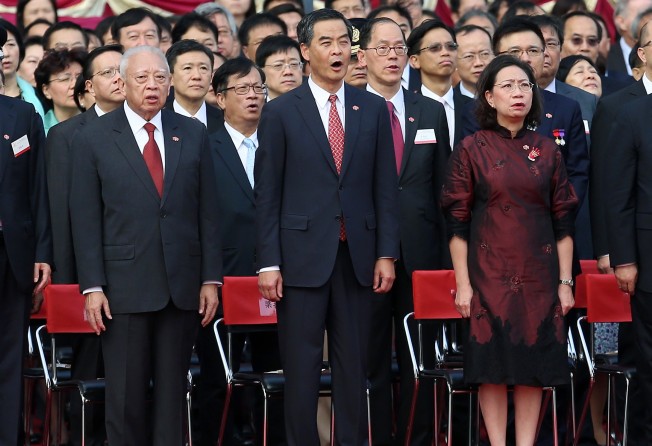Letters to the Editor, September 11, 2017

Anthem must be respected by Hongkongers
I would not be opposed to a national anthem law being passed in Hong Kong.
You can be opposed to the Chinese government and its policies. We enjoy freedom of speech in the city, and so we can speak out against it when we disagree with what it is doing.
However, we cannot deny that Hong Kong is part of China.
Yau Wai-ching, one of the six disqualified local lawmakers, during her oath-taking ceremony in the Legislative Council chamber laid out a banner which said: “Hong Kong is not China”.
I believe we have to respect our country and our national anthem.
A law is needed to protect the anthem from abuse.
Some Hong Kong soccer fans have booed the national anthem before World Cup qualification matches. This is improper behaviour, as the anthem represents the entire country. It damages the nation’s reputation when people from other countries see the fans acting in this way.
I do hope that all Hong Kong citizens can eventually agree to show respect for our anthem.
Sammi Lee, Tseung Kwan O
We can all do our bit to curb air pollution
We are all affected by Hong Kong’s air pollution. Dirty air has health consequences for residents, especially fine particulate matter (PM2.5) which can reach deep into our lungs.
On some days when pollution levels have been particularly high, schools have had to cancel outdoor events, including sports days.
All citizens should unite, take a stand and pledge to try to tackle our air pollution problem.
After all, this pollution is partly caused by the decisions individuals make every day, such as driving their car instead of taking public transport and keeping air conditioners on at home when they could easily use a fan instead.
Attitudes need to change. If it is possible, people should get into the habit of deciding to, for example, catch the MTR or a bus and leave the car at home, or even walking if the destination is not too far. And if people argue they would waste valuable time doing this, there are now apps telling them when the bus will arrive at their stop, so they can plan their journey more efficiently and work out when they will arrive at their destination.
What matters is that all Hong Kong citizens recognise the importance of playing their part in trying to clean up this city.
Ellie Liu, Ho Man Tin
Hikers should avoid taking stupid risks
Emergency services workers were called upon to rescue people in different situations when two typhoons hit the city last month.
One of these rescue efforts was a major exercise when two hikers from the mainland were stranded on Kowloon Peak during Severe Tropical Storm Pakhar.
Also, Hong Kong rescuers saved 11 sailors from a sinking Chinese cargo ship in waters east of the city.
During the rescue of the hikers, one fireman was injured.
This highlights the need for people to take sensible precautions when they are preparing for a hike, particularly in locations that can prove challenging, such as Kowloon Peak.
There are well-known landmarks which are popular with people who want to take photos including selfies, but they may not be safe and people going there will often behave irresponsibly.
This kind of improper behaviour is a waste of manpower and it puts others at risk.
Hikers need to plan walks in advance and check things like the weather. Also, if it is a very difficult route, they must ask themselves if they are fit enough to complete it. They must not take stupid risks.
Zoe Chung Ka-man, Po Lam
Education the key to creating better society
A recent survey found that many students are pessimistic about their future and that of the city.
I think a lot of young people feel powerless, but I believe they can effect change if they try. The key is playing an important role in the future events that will shape Hong Kong is education.
I believe that by studying hard and making the best effort I can, I will be able to make a contribution to our society. Young people must be willing to fight for Hong Kong’s future.
Mercury Wong Cheuk-in, Yau Yat Chuen
User-friendly flats can help elderly tenants
I congratulate Marco Wu Moon-hoi, chairman of the Housing Society, for speaking out about “ageing in place” (“Incentives needed to make flats more suitable for elderly”, September 4).
It is all very well thinking about the flats we have yet to build, but there are tens of thousands living, and who will continue growing older, in flats which could be made safer and more convenient and liveable – just for a few thousand dollars for each home.
The Housing Society has done this for its rental flats.
I write from the other end of life, and I have installed a couple of bars in my own flat. I know what a difference that makes.
The Housing Authority could be provided the resources (please don’t talk about money) to do the same for all their rented units. The lives of its tenants could be made so much more liveable and happier as they face the years ahead.
David Akers-Jones, Tsim Sha Tsui